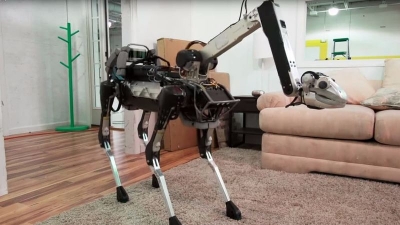
The Czech playwright Karel Capek introduced the name robot in the early 1920s. He wrote a play called Rossum’s Universal Robots in which an army of industrial robots became so clever that they took over the world. Capek coined the word robot from the Czech robota, which means ‘slavery’. Since then men have worried not so much about robots taking over the world, but more about robots taking over their jobs.
Robots have indeed taken over some jobs — dull, mechanical, routine work. They save costs because there is no need for them to change shifts, they do not tire or lose concentration, they do not take tea or coffee breaks, they do not fall ill (although they may need repairs), and they do not go on strike. But even though American and British researchers have produced robotic four-fingered hands capable of picking a flower, robots are still a long way from having the perception, dexterity or flexibility of human beings.
It is, however, generally accepted that the responsible use of robots in industry is beneficial because it saves people from doing dull and dangerous jobs. Robots were used to clear up the radioactive debris after the Three Mile Island nuclear accident in America in 1979. They are also being developed for inspecting and manufacturing nuclear plants, fighting fires, Felling forest trees, and acting as security guards — walking burglar alarms that can warn human guards of an intruder. And I four-legged, 72 ton robot was used to roll boulders to build up the sea wall in Tokyo Bay, Japan, in 1986 — saving 50 divers from the risky task.
Experiments are also under way with robots that can help infirm and disabled people to be independent. Researchers in Britain and America are developing robots that can respond to spoken commands. They will be able to undertake such tasks as brushing teeth, serving soup, loading a computer, opening filing cabinets and picking up mail.
Picture Credit : Google

